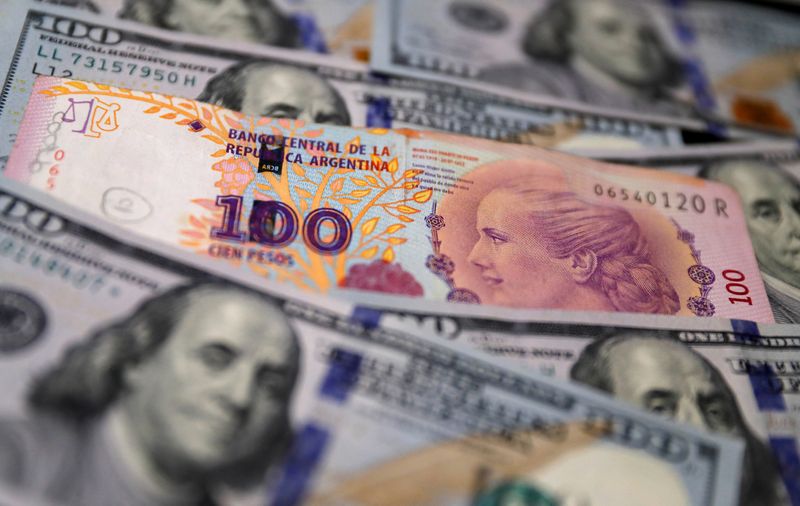By Lucila Sigal
BUENOS AIRES (Reuters) - Jose Zegarra, a Peruvian tourist in Argentina's capital Buenos Aires, found out the hard way that the value of the country's peso isn't always what it seems as tough capital controls spawn an array of wildly diverging exchange rates.
Charged near the official 150 pesos per U.S. dollar when he paid for a meal by credit card, he discovered his dollar fetched him twice as many pesos at one of the city's flourishing money changers at what locals know as the "blue" exchange rate.
"It made me feel a bit foolish," Zegarra told Reuters.
The South American country imposed controls in 2019 to protect its beleaguered currency, limiting access to dollars and sparking a boom in informal foreign exchange markets where the peso is valued at far below the official rate.
In recent months the government has introduced various additional levies for converting to foreign currency, leading to an explosion of different rates from a so-called "Qatar" World Cup rate for travel to a so-called "Netflix (NASDAQ:NFLX)" rate for overseas services like streaming.
The blossoming of parallel foreign exchange rates has gained pace in recent weeks, becoming the target of memes online, one calling the array a "tutti-frutti". But it also reflects a serious risk the government faces to protect dwindling dollar reserves needed to pay back debt.
Investment bank Morgan Stanley (NYSE:MS) estimated in a September report that the central bank's liquid net forex reserves had dropped to negative $3.5 billion, something the government has looked to reverse with faster grains sales.
The government and central bank argue that the controls are needed to protect foreign reserves and stabilize the economy. It wants to avoid a sharp devaluation, though the peso has slowly but surely lost some 50% against the dollar this year anyway.
"It is clear that the central bank has a duty to preserve its reserves and that is why it is working hard to do so," said a central bank source who asked not to be named, adding parallel rates were simply caused by market "supply and demand".
The bank declined to comment.
Graphic: Argentina's dollar rates https://graphics.reuters.com/ARGENTINA-CURRENCY/zjpqkxxqlpx/chart.png
'COLDPLAY' DOLLAR
Argentines have long mistrusted their own currency, often choosing to save in dollars to protect against inflation - heading towards 100% this year - and devaluation. Previous tough and sudden capital controls have also made savers wary.
Swirling economic crises in recent years, including a debt default and a major deal with the International Monetary Fund (IMF), has put more pressure on the currency and reserves.
"All these different exchange rates shows a political desperation for dollars," said Eduardo Maehler, 37, a self-employed worker in Buenos Aires.
The government has tightened access to the dollar and added levies, especially on overseas travel and luxuries. It created a temporary "soy" dollar in September to boost soy exports by giving producers more pesos for their dollar-based sales.
Some have popped up more organically: a so-called "Coldplay" dollar for paying sports stars or music performers in the country. The British band is performing ten concerts later this month. A "Netflix" dollar, meanwhile, refers to a rate elevated by various taxes on overseas streaming services.
Graphic: Argentina - currency split https://graphics.reuters.com/ARGENTINA-ECONOMY/akvezloqqpr/chart.png
This month, the government added a 25% levy on monthly spending over $300 on overseas trips, goods in foreign currencies and luxury goods, on top of an existing 45% rate and 30% tax. The timing of the move ahead of the soccer World Cup next month led to it being dubbed the "Qatar" rate.
"Clearly this has made travel more expensive in local currency," said Federico Rossi, owner of a travel agency in the city, adding some people would give up their trips as a result.
Aldo Abram, executive director of consultancy Fundación Libertad y Progreso, said measures to keep the peso "artificially cheap" were not sustainable and would feed inflation.
"We know the cost of imposing these controls over time: it always ends in a very deep crisis," he said.
Pedro Cristino, a grandfather in Buenos Aires, was stoical. He blamed persistently high debt levels going back decades for putting the current center-left government in a bind.
"The government is looking for many ways to solve things, some are healthy some are wrong," he said. "All I know is I wouldn't want to be trying to govern right now."
